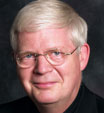Rev. Anthony Kuzniewski, S.J., professor of history, drew on the lessons of the early civil rights movement to encourage students "to accept the vocation of being men and women for others" during a homily he delivered at a Feb. 19 Mass in Mary Chapel.
Inspired by Black History Month, he explored the vocations and callings of Abraham Lincoln, Rosa Parks, and Martin Luther King, Jr.
Fr. Kuzniewski described his homily as a sort of prelude to the story of "Fraternity," about African American men at Holy Cross in the late 1960s and early 1970s — a time of racial tension. “As men and women of the Cross, we can't just ignore these things," he said. "To retreat into ignorance on these issues, or to go on as if they didn’t matter, would be to act like lost souls, to sell out our birthright as daughters and sons of Holy Cross, to conceal our light under a bushel, just like the man who buried his master’s funds instead of investing them.”
***
Feb. 19, 2012
Sixth Sunday in Ordinary Time
See, I am doing something new! Now it springs forth, do you not perceive it? In the desert I make a way, in the wasteland, rivers. The people I formed for myself, that they might announce my praise. (Isaiah 43)
Brothers and Sisters in the Lord:
February is Black History Month, and we are blessed here at Holy Cross that this year’s commemoration of African-Americans’ contribution to the nation occurs while we are still basking in the glow of the publication of “Fraternity” and of the events surrounding the honorary degree awarded to Clarence Thomas ’71. “See, I am doing something new,” says God in today’s first reading. When and how the making of God’s newness comes to pass, has everything to do with the willingness of human beings to accept the vocation of being men and women for others.
Consider Abraham Lincoln, whose 203rd birthday we celebrated earlier this month. One of my favorite moments in his life is at the second inaugural in March of 1865. The war was almost won, and he talked about God. Both sides invoke God’s aid in this war, he said. The prayers of both cannot be answered, and the prayers of neither may be. The war, he suggested, was America’s punishment for the sin of slavery; and if God willed that the war should last 200 years to atone for the 200 years in which blacks had been held under the lash, and until the blood spilt in war came up to the measure of the blood spilt in slavery, still nobody could argue against the justice of God. God may be on our side, as our T-shirts proudly proclaim; but God is never exclusively with us because all of us are imperfect, which was Lincoln’s point. Getting ourselves on God’s side is the challenge of our lifetimes.
Consider Rosa Parks. For a good part of my life, I assumed that she was simply a well-intentioned black woman who sat down on a bus. But once you get to know her story, it becomes clear that far more was at stake.
For starters, she had a high school education — only a small percentage of Southern black women in her generation were so well educated. She was an officer in the Montgomery chapter of NAACP. She tried three times before she succeeded in registering to vote. She was a woman of deep faith, active in her church and taught Sunday School to children. Shortly before the bus episode in Montgomery, Alabama, in1955, she attended a workshop on racial equality in Tennessee; and there, as a fully mature adult, she had her first experience of sitting down to dinner and being waited on by a white person. She had a history with the driver of that bus on which she was arrested. A dozen years earlier, following the segregation laws, she had paid her fare at the front door, then made her way to the rear door to enter the bus, only to have him close the door in her face and take off. Ever since, she had refused to ride a bus he was driving, but on this day she was so tired that she didn’t notice the driver until after she had boarded. And when they arrested her, she said, “You may do that.” She gave them permission; she, and the God she believed in with all her strength, allowed the arrest to happen.
Do you see what was at stake here? Called to be a woman for others, Rosa Parks sat down on a bus. That was her vocation — not an act of stubborn defiance, but staking the claim to a human right she had prepared and prayed for, all her life. With that gesture, she launched a new phase in the struggle for human equality. “See,” says God, “I am doing something new.”
Another illustration occurred in November of 1962, when Martin Luther King Jr. visited Holy Cross. His lecture was widely advertised at local campuses and in the press. Before the lecture, he dined as a guest of the Jesuit community in their dining room in Fenwick Hall. At the Field House, 1500+ were waiting to hear what he would say.
“Segregation may be on its deathbed, but the guardians of the status quo are on hand with oxygen to keep it alive.” He asked for “reasonable calmness but no slowing down.” “Social progress does not come by itself.” He spoke here three years before the Voting Rights Act of 1965 guaranteed black voter registration. There were still “intelligence tests” to black would-be black registrants: “How many bubbles do you find in a cake of soap?” (Trivializing a fellow citizen’s humanity in such callous fashion.)
After the lecture, there was an unsigned article in The Crusader. It was descriptive, but cautious — no enthusiastic endorsement of the message in those still early days of the civil rights movement — just a report. (The events depicted in Diane Brady’s book had not yet come to pass.) There was a caption under King’s picture: “Big, but humble.” So a seed was planted here, fragile to be sure, but grew by the end of the decade into the crusade that diversified our campus with minority students and the Black Student Union, and eradicated forever the narrow limits of imagination and experience that threatened this place — our place — with irrelevance and hypocrisy.
For me, the single most powerful line in Dr. King’s address was this: “Too many whites and Negroes hate each other because they fear; they fear because they don’t know; and they don’t know because they are separated.” And for all the truthfulness that insight carried about American segregation in the early sixties, it speaks to us now. When we work out of fear to separate ourselves from other human beings, to castigate them for being different or having opposing insights, in public or private life, God’s not on our side.
As men and women of the Cross, we can’t just ignore these things. To retreat into ignorance on these issues, or to go on as if they didn’t matter, would be to act like lost souls, to sell out our birthright as daughters and sons of Holy Cross, to conceal our light under a bushel, just like the man who buried his master’s funds instead of investing them.
Brothers and Sisters: Truly, God is always doing something new. We are called to live as seekers after that newness. We all know life can be complex. February alone offers us Valentine’s Day (romantic love), Presidents’ Day (the responsibility of dutiful service), Black History Month (MLK’s plea for breaking down barriers); and in today’s Gospel, the story of Jesus and the paralytic who was healed in body and soul. We are invited to put these elements into the blender of our minds and hearts. Stir them up; shake them together. Taste the contents, with all their sweet and bitter elements. Somewhere in this crazy combination is a lesson about the possibility of living as men and women for others by positioning ourselves with God, until we can understand where the next possibility of newness — of God’s creative newness — is taking place. In this context, living our vocation may be as ordinary — and as profound — as sitting down on a bus.
A. J. Kuzniewski, S.J.
Related Information:
- Learn more about “Fraternity,” read an excerpt, and see reviews and media coverage
- Read Fr. Kuzniewski's blog
- History

